Our Blog

5 Facts to Know About Glaucoma
January is Glaucoma Awareness Month, the perfect time to raise awareness of glaucoma and how it is detected and treated. Glaucoma accounts for 9 to 12% of all cases of blindness worldwide — and is a leading cause of total vision loss in the United States. About...

3 Reasons to Get an Eye Exam Before Buying a VR Headset
It’s no surprise that virtual reality (VR) headsets are at the top of many holiday wish lists. When you slip on that headset, it transports you to another world: standing at the top of a virtual mountain, flying in a hot air balloon, or battling monsters with a longsword. VR promises instant access to immersive worlds, interactive games, and even a way to learn new skills. But before you surprise your child (or spouse!) with a VR headset, there’s something significant you should check first — their eyes. Before you strap on that headset, it’s important to realize that VR headsets can potentially impact your eyes and visual system. To understand why, let’s...
Flex 125 Spending Account Funds: Time to Use it Or Lose It
5 Scenarios To Avoid Next Year By Using Your Flex 125 Funds Today Why Your Flex Savings Account is a Tax Savings Superhero for Eyewear It’s the Holiday Season! Everywhere you look, there are decorations, lights, and people in good spirits! What a wonderful time...
10 Ways to Safeguard Diabetic Eyes
Protect Your Vision: 10 Essential Tips to Safeguard Diabetic Eyes It’s a fact: Living with diabetes means that you are more likely to experience vision problems. But here’s another fact: You can help prevent diabetic eye disease or slow its progression by...
What is Diabetic Eye Disease?
6 Questions (and Answers!) About Diabetic Eye Disease November is American Diabetes Month. With more than 38 million Americans – 15% of our country’s adult population – experiencing diabetes, it’s an important time to bring awareness to this...
How Guide Dogs Empower the Blind and Visually Impaired
Earlier in October, we observed World Sight Day, a global event dedicated to raising awareness about eye health and preventing blindness. For people who have the gift of sight, navigating daily activities like crossing streets, shopping, and reading signs is second...
9 Fun Eye Facts in Observance of World Sight Day
October 10 marks World Sight Day, a global event dedicated to raising awareness about eye health, preventing blindness, the various diseases that affect our vision, and the effects those conditions can have on everyday life. The global observance day was launched by...
9 Critical Visual Skills for Student Athlete Success
9 Critical Visual Skills Student Athletes Need to Perform Their Best It’s that time of year again! Back-to-school means back-to sports—and competition is ramping up for exciting seasons of football, soccer, baseball, basketball, golf, and tennis, plus any...
How to Recognize Signs of Vision Problems in School-Age Children
Your eyes are more than just windows to the world. The eyes are a complex and powerful tool that enable us to experience life in vivid detail. From the moment you wake up and see the morning light to the time you close your eyes at bedtime, your vision impacts how you...
Why School Vision Screenings Fall Short: The Importance of a Full Eye Exam
It’s that time again — August means back-to-school for many children. Parents are busy buying the perfect backpack, notebooks, writing utensils, and school clothes so students have everything they need for a successful school year. But did you know that...
5 Tips Your College Student Needs To Know About Healthy Vision
Are you a parent with a child gearing up for their first year of college? Or are you a student ready to embark on the excitement of university life? As you navigate the transition between the carefree days of childhood and full-on adulting, it’s easy to overlook...








